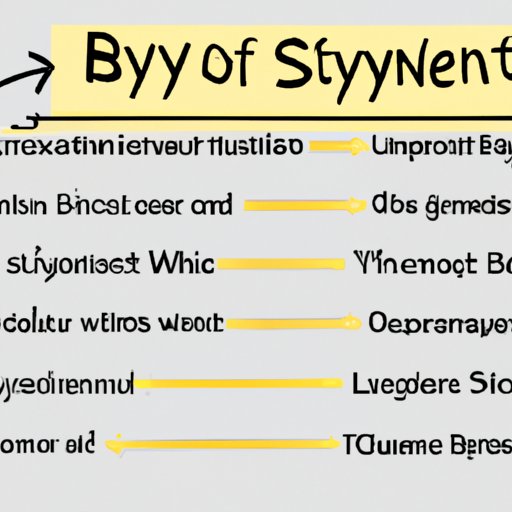Introduction
Syntax is a fundamental part of language that influences how we express our thoughts and ideas through writing. It is essential for writers to understand the fundamentals of syntax in order to effectively communicate their thoughts and ideas. In this article, we will explore what is syntax in writing, why is it important, and how to master syntax for improved writing skills.
Exploring the Basics of Syntax in Writing
Syntax refers to the rules and principles that govern the structure of sentences in any given language. It is the foundation of written language and is used to construct phrases, clauses, and sentences. Syntax is closely related to grammar and plays an important role in the way words are used and arranged in a sentence.
There are several types of syntax, such as descriptive syntax, functional syntax, and generative syntax. Descriptive syntax is the study of how sentences are formed in a particular language. Functional syntax studies how sentences are used in communication. Generative syntax is the study of how sentences are generated from underlying structures.
Parts of speech such as nouns, adjectives, verbs, and adverbs also play an important role in syntax. These parts of speech help to determine the structure of a sentence and can be combined in various ways to create meaningful sentences.

An Introduction to Syntax and its Role in Writing
The purpose of syntax is to enable writers to communicate their ideas and thoughts clearly and effectively. Syntax helps to organize words into meaningful sentences by providing rules for how words should be arranged within a sentence. By understanding the fundamentals of syntax, writers can use language more precisely and accurately.
Syntax also helps to convey meaning in writing. Different combinations of words and phrases can have different meanings depending on how they are used. For example, the phrase “I am going” can mean something different than the phrase “I went.” By understanding syntax, writers can ensure that their sentences convey the intended meaning.

How Syntax Enhances Clarity in Writing
Sentence structure is an essential part of syntax and is used to create clear and concise sentences. Sentences should be structured in a logical manner and should follow the rules of grammar. Proper sentence structure helps to make complex ideas easier to understand by breaking them down into simpler components.
Grammar rules are another important aspect of syntax. Grammar rules dictate how words should be used in a sentence and help to ensure that the sentence conveys the intended meaning. Punctuation is also important for ensuring clarity in writing. Punctuation marks such as commas, periods, and exclamation points can help to emphasize certain words or phrases and make sentences easier to understand.
A Guide to Mastering Syntax in Writing
Improving syntax in writing requires practice and dedication. Practicing writing exercises can help to build an understanding of syntax and grammar rules. There are many resources available online that provide practice exercises and tips for mastering syntax in writing.
It is also beneficial to read extensively and pay attention to the syntax used in different pieces of writing. Reading can help to expand one’s understanding of syntax and can provide insight into how to structure sentences for clarity and precision.
Analyzing Syntax to Improve Writing Skills
Once a basic understanding of syntax has been established, it is important to analyze one’s own writing for syntactic errors. Identifying syntactic errors can help to refine sentence structure and improve overall clarity in writing. Analyzing syntax can also help to identify patterns in one’s writing and can be used to correct common mistakes.
Refining sentence structure is another way to improve syntax in writing. This involves rearranging words and phrases to create clearer and more concise sentences. It is also important to keep in mind the purpose of the sentence when refining sentence structure, as this can help to ensure that the sentence conveys the intended meaning.

The Benefits of Understanding Syntax in Writing
Understanding syntax is essential for effective communication in writing. It can help to ensure that ideas and thoughts are expressed clearly and accurately. Improving syntax in writing can also help to increase confidence, as writers will be more aware of their ability to communicate effectively.
By mastering syntax, writers can also become more efficient in their writing. Understanding syntax can save time by eliminating the need to revise sentences for clarity and accuracy. It can also help to reduce the amount of editing required, as fewer syntactic errors will need to be corrected.
Conclusion
Syntax is a vital part of language that enables us to effectively convey our thoughts and ideas through writing. Understanding the fundamentals of syntax is essential for improving one’s writing skills. This article explored what is syntax in writing, why is it important, and how to master syntax for improved writing skills.
By understanding the purpose of syntax and how it helps to communicate ideas, writers can use language more precisely and accurately. Practicing writing exercises and analyzing one’s own writing for syntactic errors can help to refine sentence structure for better clarity in writing. Mastering syntax can help to improve communication and increase confidence in writing.
(Note: Is this article not meeting your expectations? Do you have knowledge or insights to share? Unlock new opportunities and expand your reach by joining our authors team. Click Registration to join us and share your expertise with our readers.)
